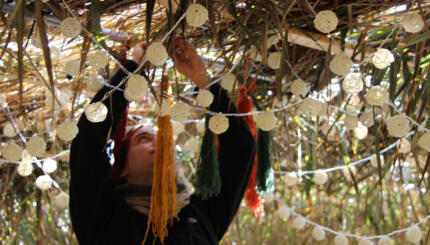After instructing the Israelites to observe the seven-day festival of , the continues, “On the eighth day you shall observe a sacred occasion” (Leviticus 23:36). What is the significance of this festival? It is not part of Sukkot and the Torah provides no clue as to what prompts the establishment of the holiday.
A Midrash provides insight into the rabbis’ understanding of the festival. Playing on the word atzeret, a solemn gathering, God says to the Israelites who have assembled for Sukkot: Let me keep you near me (atzarti etchem etzli), like a king who invited his children to a feast for a number of days. When it was time for them to leave, he said, “Children, please stay with me another day; it is hard for me to let you go.”
Israel is so dear to God that God wants to prolong the festival, a time when the two are especially close. We may feel exhausted after the High Holidays and a week of Sukkot, but God is eager for a little more of our company.
We express an emotion similar to God’s through our recitation of Yizkor [the memorial prayer for deceased relatives] on Shemini Atzeret. We are unwilling to let go of the people we love, even after their deaths. When we recite Yizkor, we are saying to them, “Stay with us; it’s hard for us to let you go.” No amount of time together is enough; the more intense the relationship the harder the separation.

Help us keep Jewish knowledge accessible to millions of people around the world.
Your donation to My Jewish Learning fuels endless journeys of Jewish discovery. With your help, My Jewish Learning can continue to provide nonstop opportunities for learning, connection and growth.
Relationships are exhausting; at times, one party or the other wants to pull back and rest. On Shemini Atzeret, the tradition teaches us, God reaches out to strengthen the bond with Israel. We too can reach out on the holiday, not only to the dead but to the living as well, drawing others closer to us.


